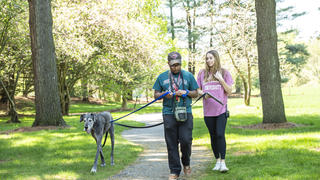Starting college can be an exciting yet stressful time. Luckily, there are ways to get ready for this transition before you even step on campus. Below are some ways you can plan, practice, and prepare for a smooth transition into university life.
Plan to get involved: Participation in on-campus activities is a great way to have fun, make friends, and to create a sense of community in a new place. First, identify activities that interest you or that you were involved in during high school. Many schools, including Saint Joe’s, offer a wide range of activities spanning from special interest clubs and academic organizations (such as the Honors Society), to club sports, community service opportunities, and on-campus jobs. In addition, there are frequent university-sponsored events available to all students. Make sure to mark your calendar for the next movie night, Hawks basketball game, and more!
Practice independent living skills: When preparing to live away from home, it is important to practice skills that will help you function independently. First, think about what you are already good at doing on your own. Maybe you feel confident in your cooking, cleaning, or laundry skills, or already do some of your family’s grocery shopping. Next, identify potential barriers. Do you have access to money via a credit or debit card? Do you drive, or are you familiar with ride sharing apps or public transportation? If any of these sound challenging, now is a great time to practice. Volunteer to cook small meals at home, take a short trip using local transportation, or set up mobile banking this summer. Feeling confident in your ability to live on your own can help relieve some anxiety related to this transition.
Prepare for accommodations: In college (as compared to high school), students take a more active role when receiving accommodations and are required to self-identify to the office of disability services. Before contacting them, it is helpful to have a good sense of what works best for you. Practice self-advocacy by familiarizing yourself with college- level accommodations and what is offered at your school, as well as reviewing what was most helpful to you in high school.
Locate services and supports: In addition to academic accommodations, it is helpful to consider auxiliary supports. Compare offerings at your school with what you currently receive. Are there any services that you would like to retain, such as a private therapist or social skills group? Will you utilize on-campus resources such as the counseling center or tutoring? Many students on the spectrum benefit from a structured autism support program like the ASPIRE Program at Saint Joe’s. This program offers individual case management with a masters-level clinician, weekly peer mentoring and study halls, and two years of targeted skills courses. Creating a plan for ongoing support before issues arise will leave you prepared to face any challenges that come your way.
Identify a major or career path: Choosing a school to attend is closely tied to choosing a career path. It is important to select a school that offers majors or minors that align with your interests. If you need some time to decide, talking with your academic advisor, the career center at your school, and networking with friends and family can help give you a better picture of what jobs are out there and what feels right for you. If your plans and goals end up changing throughout your college career that’s okay too!
Arrange for appropriate housing: Living away from home, especially for the first time, can feel overwhelming. Mitigate some of this stress by setting up living arrangements that feel most comfortable for you. There are a few options to consider when thinking about campus life. First, are you most comfortable sharing a room, or will you seek a single room accommodation? If sharing, you will need to decide whether you will identify a roommate ahead of time or be assigned one from the pool of other freshmen. Additionally, many schools offer a variety of dorm styles (two-person rooms, suites with a shared common area, etc.). Touring campus can help you get a good sense of which is the best fit for you.
Starting college doesn’t have to feel completely overwhelming. Start using these tips today to prepare for the road ahead!
